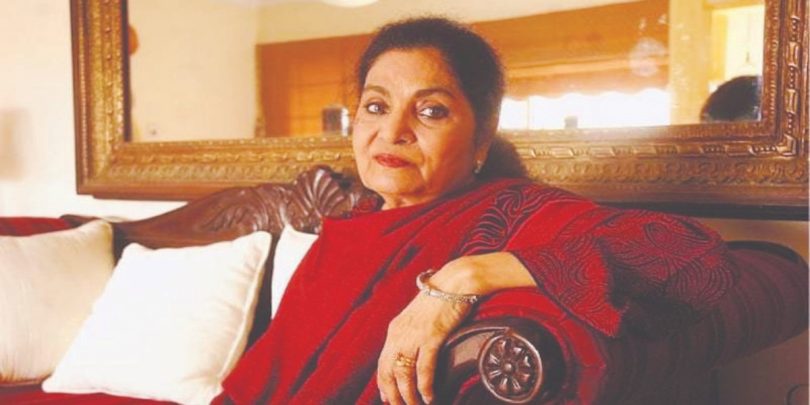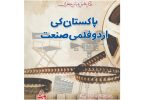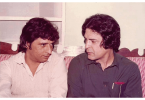It has been one year since the legendary playwright Haseena Moin left her fans saddened with her last bow. Her death on 26th March 2021 not only left a vacuum in Pakistan’s entertainment industry but also in the lives of those who grew up watching her dramas between the 1970s and 2010s.
Born on 20th November 1941 in Kanpur, Haseena Moin migrated to Pakistan after Independence and settled in Karachi after briefly making Rawalpindi and Lahore her home. After earning her Master of Arts (MA) degree from Karachi University in 1963, she joined Radio Pakistan as a playwright and became successful instantly. It was from the Radio that renowned poet Iftikhar Arif handpicked her to write a long play for PTV which was aired in 1969 as Eid Ka Jorra. And hence began the fifty-year journey that saw Haseena Moin pen one hit after another, till death did them apart.
In a world dominated by male playwrights, Haseena Moin was the only female who could dare to bring the change. Before she wrote Pakistan Television’s first-ever original drama Kiran Kahani, viewers used to live on TV dramas that were adapted from other mediums like stage or novels. When color transmission began in Pakistan, it was her play Parchaiyyan that brought color into the viewer’s lives before others in 1976. She ruled the airwaves with back-to-back hits in the 1980s with Ankahi, Tanhaiyan, and Dhoop Kinarey while taking a serious turn with Aahat in the early 1990s which surprised her fans.
She was the writer behind PTV’s historical series Tansen as well, and when PTV needed someone to counter the onslaught of private productions, she came up with Kasak and Kohar, besides Jaane Anjane in the 1990s. That’s not all, when Bollywood legend Raj Kapoor was putting his Indo-Pak friendship flick Henna together in the late 1980s, he opted for Haseena Moin as the dialogue writer who in turn introduced Zeba Bakhtiar to the world of films.
Her magic wasn’t limited to Pakistan alone; she was undoubtedly the first playwright from this side of the Wagah to pen not one but two TV serials for Indian Television. One of them Kashmakash had Javed Jaffrey and Suchitra Krishnamoorti in the lead while Tanha featured Sajid Hasan and Marina Khan as actors from Pakistan.
There is a reason why Haseena Moin’s work is remembered even today, after so many years. She was one of the first female progressive writers of PTV and made sure her protagonist – a female – did something useful with her life instead of crying her heart out. That’s why Sana Murad in Ankahi wanted to save money for her brother’s surgery; business-minded Zara Ahmed in Tanhaiyan had one aim that was to buy back her parents’ house; Dr. Zoya wanted to prove her mettle in Dhoop Kinarey and Sabrina in Kasak was an independent woman who ran a garment business.
That might have something to do with her being an educationist, but then no one else used dramas better than her to paint a grand picture of Pakistan. The newly-inaugurated Aga Khan Hospital in Karachi made its way into her script (Tanhaiyan) as did the Jinnah Terminal of the Karachi Airport (Kasak). The first time a cordless phone was used in a TV drama (Dhoop Kinarey) was also penned by Haseena Moin, as was one of the first plays to be shot abroad (Jaane Anjane).
She was not just the most fun person to work with, she created characters from thin air and gave them dialogues that helped them become household names in no time. Who can forget the smart Mamoon from Ankahi who would not have been taken seriously had he not posed as the most intelligent person in the room; or Buqrat from Tanhaiyan who would have been a successful person had he not worked for Aapa Begum; or even Dr. Irfan from Dhoop Kinarey who knew how to diffuse any kind of tension, even if the odds were against him. She made use of the limited actors in those days and wrote characters for Saleem Nasir, Behroze Sabzwari, Jamshed Ansari, Sajid Hasan, and others that became even more popular than the main leads of those plays.
It was considered an honor for actors and actresses to work in a Haseena Moin play, especially in the 1970s and the 1980s when she was on top of her game. The elderly Manzoor Qureshi who currently appears as a grandfather in TV dramas became a heartthrob in the 70s with Kiran Kahani, and the same thing happened when Rehan Sheikh played the same character in the late 1990s in its remake. Before he became a popular film actor in the 1980s, Javed Sheikh was known as the irritating Faraz from Tanhaiyan, while Rahat Kazmi’s Dr. Ahmer became so popular in Dhoop Kinarey that people started naming their sons after the good doctor.
For those who grew up in the Haseena Moin-era, life was simple. Youngsters knew that her drama would not bore them with her tongue-in-cheek dialogues, elders could relate to their relatives by watching her characters, and girls, they knew that the drama would end up on a happy note, with girl-power saving the day. The only time she didn’t have a happy ending was in Uncle Urfi where the death of the main lead played by Shehla Ahmed left the audience so shocked that she decided never to kill a character onscreen after that!
Although she did write dialogues of a few Pakistani films including Syed Kamal’s Yahan Se Wahan Tak, Usman Peerzada’s Nazdikiyan, Javed Sheikh’s Kahin Pyar Na Ho Jaye, and Zulfikar Sheikh’s Sacch, she was more at ease on TV which owed her more for her contribution than she owed to the medium. From the 1970s till 2010s, Haseena Moin was a name to reckon with, who could make you smile when the chips were down, and raise the bar when the going got tough. Her death might have stopped her from providing new material, but she is still contributing to the betterment of society with her work.
BOX ITEM: Most memorable Haseena Moin characters!
While playwrights usually don’t give much importance to side characters, Haseena Moin knew their importance from a very early stage of her career. She knew that if done right, these characters would outshine the main leads, and that’s what happened when the actors who played these characters and the directors clicked together. Let’s take a look at the top 7 side characters she created that are still alive and more popular than the leads, even after so many years.
Hasnat Bhai in Uncle Urfi (1972)
Played by: Jamshed Ansari
Directed by: Shireen Khan-Mohsin Ali
Why is it memorable: Jamshed Ansari’s execution was so perfect that even after 50 years, no one has been able to match its popularity. The character not only had a peculiar way to address others, but he also wore a Turkish Cap at a time when it wasn’t fashionable, kept his hair oiled, and had a unique way of laughing. However, his line ‘Chakoo Hai Mere Paas’ became his identity, something he used to say whenever felt threatened by his friends, families, or others.
Safdar in Kiran Kahani (1973)
Played by: Jamshed Ansari
Directed by: Shireen Khan-Mohsin Ali
Why is it memorable: If you think Qabacha in Tanhaiyan was goofy, think again for Safdar predated him by a dozen years, and was one of the first original characters created for the national television that became highly popular. Bespectacled and without an ounce of confidence in his ability to do anything right, Safdar sahab used to reply to everything with Qatayee Nahi that was either preceded or followed by a ‘For God’s sake’. Saleem Meraj’s rendition in the remake wasn’t bad either!
Mamoon in Ankahi (1982)
Played by: Saleem Nasir
Directed by: Mohsin Ali – Shoaib Mansoor
Why is it memorable: Haseena Moin created her characters from everyday life and the Mamoon Saleem Nasir played in Ankahi represented those relatives who are lazy, stay at home, and are good for nothing. He was not just trouble but also the troubleshooter, who had the knack of hatching plans without thinking of the consequences. Despite being the man of the house, he had to act sensibly to look superior to his nephew Jibran, who was always the smartest person in the room.
Jibran in Ankahi (1982)
Played by: Faisal Bilal
Directed by: Mohsin Ali – Shoaib Mansoor
Why is it memorable: The phrase ‘Jibran Kehta Hai’ might be used today to quote Khalil Jibran, but the generation that grew in the 1980s doesn’t know any Jibran other than the one in Ankahi. The super-smart kid would have the answer to every problem, except for his medical issues. It was around his ‘hole in the heart’ that his elder sister’s life revolved, and that was the reason why he spent more time around books than around the kids of his age. Hence the name Jibran, and his advice.
Mobi in Ankahi (1982)
Played by: Behroze Sabzwari
Directed by: Mohsin Ali – Shoaib Mansoor
Why is it memorable: We all have relatives who live abroad and visit Pakistan on vacations; when they act weird, they aren’t called ‘weird’, but referred to as Mobi, and one should be thankful to Haseena Moin for that. She created such a character for Behroze Sabzwari who played it to perfection; be it cooling down in the ‘swimming pool’, meeting Red Indians or flirting with any girl in his range, Mobi remains the quintessential weird cousin from abroad, who accompany their parents from the West.
Qabacha in Tanhaiyan (1985)
Played by: Behroze Sabzwari
Directed by: Shehzad Khalil
Why is it memorable: If Mobi wasn’t enough, there is Qutubuddin aka Qabacha. Behroze Sabzwari is known as Qabacha all over the world, despite playing all kinds of characters. Dressed in a three-piece suit, needing glasses to walk and read, falling for the first girl who actually talks to him, looking after his boss on his elder sister’s instructions, and not being able to end his life due to his phobias, that’s what made Qutubuddin a Qabacha. And we love him for that despite being five decades old!
Buqrat in Tanhaiyan (1985)
Played by: Jamshed Ansari
Directed by: Shehzad Khalil
Why is it memorable: For every Qabacha, there is an equal and opposite Buqrat! Jamshed Ansari was at his best as the smartest servant on the planet whose only issue was that he was employed at the wrong place. Just like his name, he was the person who had an answer to everything, yeh his employer Aapa Begum (Azra Sherwani) didn’t see him as someone special. That’s why he liked to spend more time at her brother’s place than at hers, for he understood him, and turned to him for advice, and that displeased Qabacha, who was more loyal to Buqrat’s employer than his own (Qazi Wajid).







